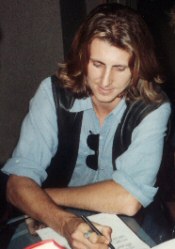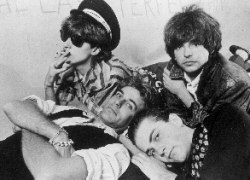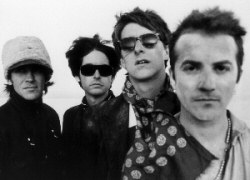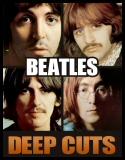
Wire Train, Found: An Interview with Kevin Hunter
12/13/2006
Music Home / Entertainment Channel / Bullz-Eye Home
For anyone else who had been searching for the band Wire Train, the search ends here. Our Lost Bands feature was online for about a week before a friend of Kevin Hunter reached out and then put Hunter in touch with us. From the knock on the door of VH-1’s “Bands Reunited” to writing with Sheryl Crow as part of the Tuesday Night Music Club, Hunter has lots to talk about and he was gracious enough to share it all with us.
Bullz-Eye: So what have you guys been up to for the past 13 years?
Kevin Hunter: Well, as far as me, I started writing as a staff songwriter for Warner and for a number of other publishing companies. Brian Macleod, the drummer, is a first-call session guy who played on everybody’s record. Jeff Trott wrote all the Sheryl Crow songs for her last four albums. And the bass player, Anders, tours with a band called Green on Red and he’s the construction supervisor on “CSI: Miami.”
BE: Cool! I actually represent a band that had a song on that show.
KH: Oh, cool.
BE: They’re called As Fast As. Songs called “Florida Sunshine.” It’s like in all the TV commercial clips.
KH: Has it been on yet?
BE: Yeah. I think it was on two weeks ago.
KH: Cool. I might have it TiVo’d. A friend of mine, Jeff Cardoni, does all the incidental music for the show. So I save a lot of the episodes.
BE: Yeah, he probably knows who they are. Cool. So you’re a staff writer? You do that full-time?
KH: Yes.
BE: And have you had any singles with anyone? Any big cuts?
KH: Obviously I wrote on Sheryl’s first album. I’ve had songs for LeAnn Womack and Billy Idol and Simple Minds. And for the last couple years, I’ve been doing mainly dance music. And I wrote some songs on Ferry Corston’s album, Damien J. Carter and Funk Investigation.
BE: Yeah, I’m not familiar with any of those.
KH: Yeah. It’s so strange, for instance, the song I did for Funk Investigation was number one in eleven countries, and I never heard it.
BE: (Laughs) Oh, that’s fun. Wow.
KH: I never heard it on the radio. But in LA the only dance we get would be if you listen to Metropolis, which is a show on KCRW on Friday nights or something.
BE: So this was a single in Europe and everywhere else?
KH: Yeah, everywhere.
BE: Interesting. Were you one of the people on the Tuesday Night Music Club?
KH: Yeah, a junior member.
BE: A junior member? You’re not one of the ones that’s bitter about everything then, or are you?
KH: I love all of them.
BE: (Laughs)
 KH: I think I’m the only one.
KH: I think I’m the only one.
BE: Right on. So are you working on anything now that you’re particularly excited about?
KH: Yeah, I’ve just finished writing a musical.
BE: Oh, cool!
KH: And it kind of challenges the assumptions about musicals, and other assumptions it just leaves intact. It’s not pushing all the boundaries at the same time. But I’ve been going back and forth to New York and seeing shows and I’m looking for a director. In fact, the guy that directed “Threepenny Opera” on Broadway is actually looking at the materials right now.
BE: So is there any similarity between doing that and being a band trying to get a record deal?
KH: No, it’s remarkably different.
BE: Is it?
KH: Well, the thing about being a staff songwriter is, you wake up every day and you’re having to try and write down the feelings of another person – someone you don’t really know, who nine times out of ten doesn’t know themselves. So it’s a real empathetic guessing game. But writing a musical, you know the characters because you made them up. All you need to do is write the right song for the right mood and it’s remarkably easy. Wire Train broke up in ’93, so I’ve been a staff songwriter for 13 years
BE: It’s honed your chops a lot, then?
KH: It does! Yeah.
BE: Yeah. I’m a songwriter too and I live in Nashville, so I know what it’s like.
KH: Oh, geez. I was signed to Hamstein for a while, and they’re a big Nashville publishing house, I was with them for like three years. So I would go down there a couple of times a year and stay at the Lowes across from Vanderbilt. And the first time I was coming in, I was taking a cab from the airport, the cab driver said, “So what do you do?” And I said, “Well I hate to be obvious, but I’m a songwriter.” And then I said to him, “Are you a songwriter?” And he said, “No, I’m the only cab driver in Nashville.” (Laughs) I always thought that would have made a great song.
BE: (Laughs) That’s hilarious.
KH: Have you had any songs cut?
BE: No, not by anyone major. But I’ve had stuff on film and TV. But since I’ve moved here, I mean, I came down here to be a songwriter, but I started a PR company for bands and that took off. Aside for writing for Bullz-Eye, that’s really my main gig is doing PR for bands.
KH: Yeah, and you know what. If you’ve got something else to do and you can just keep your hand in songwriting, that’s a smart move right now. I mean, I watched all the publishing houses go from having 10, 20, 30 writers to having none. Over the last five years the whole business of it’s really fallen apart. Yeah, there’s no money in it. All you’ve got to do to make people understand, because I’m always telling people the music business is over, and they just don’t understand, is tell them, “Tower Records closed!” Tower Records on the Sunset Strip no longer exists. People aren’t buying CD’s.
BE: Yeah, that’s all you need to know.
KH: Although you were smart to go to Nashville, because Nashville is one of the few markets that’s holding its own.
BE: So are there a lot of people that try to contact you about Wire Train?
KH: It does happen. Wire Train did a VH1 “Bands Reunited” about four years ago.
BE: Oh, did you really?
KH: Yeah. The funny thing was they couldn’t get anyone to do the show. They asked everyone. They had asked us as one of the first bands because they had made a list of the bands that people wanted to get back together. And you know, it was bands like the Band and the Clash. And for some reason Wire Train was on the initial list. So they asked us and we said no. And I had become friends with the producer in the meantime, which was just a coincidence. And finally she said, “Look, I’ve put so much work into this. The show’s not going to happen if someone doesn’t say yes.” And so we did it and it was really, really, really fun. We hadn’t played together in like ten years.
BE: I watched that show and I don’t remember seeing that episode.
KH: It never aired!
BE: Oh, it never aired?
KH: Yeah, because the host was a guy named Jimmy Fallon, I think his name was. And after watching our episode he got fired. The network fired him and then they got the other guy.
BE: Is that the Jimmy Fallon from “Saturday Night Live,”or is it somebody else?
KH: Um, no. It was somebody else who has the same name.
BE: Interesting.
KH: Yeah, it was so good. I mean, let’s put it this way: with Brian doing what he’s doing and Jeffrey, very busy every day in the studio, the chances of us paying for cartage and booking rehearsal studios and scheduling a week’s worth of rehearsals and scheduling a show would never have happened. So the way we see it, we were kind of happy that it didn’t air. Because first of all, what’s going to happen? Are we going to sell like nine records?
BE: And everyone’s going to expect you to go out and tour.
KH: And as it was we got to have this sort of catered, weeklong Wire Train party. And people flew in from South Africa and Scotland and Thailand. And we played at the Whiskey. It was incredibly fun.
BE: That’s cool! So does anyone like Apple ever try to get a hold of you guys to put your catalog online?
KH: You know, it’s really strange, it’s so convoluted as far as who owns what for Wire Train because we signed to a little label called 415, and they got swallowed up by CBS when CBS secretly was trying to sign Wire Train. So as soon as Wire Train signed to 415, CBS bought 415. It seems like an expensive way to go about it. So now some guys in New Jersey own 415 and I guess they’re so busy playing golf that they haven’t heard of iTunes yet. (Laughs) I don’t think any of the 415 catalog is on iTunes. But you can buy the videos on there. Did you see that?
BE: Yeah. You’ve got two or three videos on iTunes. That’s all I’ve seen. In fact, I downloaded a couple of them.
KH: Yeah, really embarrassing stuff. I mean, one thinks that one’s escaped one’s past. And boom there it is, on the Internet. I actually like one of the videos though. That one for “She Comes On,” it’s black and white. David Fincher did it. It was really fun to make.
BE: Cool. So the band, did you guys just break up after that last record and kind of go your separate ways, or did you just kind of stop doing things?
KH: Well, you know, it was 1993. We actually made another record called Snug for MCA. And we turned it in to them and the story goes that they had the meeting to decide what to do with the record. And the first song was a party, the chorus of which had 50 people shouting, “Who gives a shit.” And the story goes that Wire Train’s enemies at MCA turned the CD player off at the end of the first song and said, “This band is so dropped.”
BE: Wow.
KH: And it’s a great record. Have you heard it?
BE: No.
KH: The guys at the website, the Scottish one…they have permission to give it out if you’re interested.
BE: Oh, cool. I’ll check it out.
 KH: Anyway, so we turned that in and they dropped us. And to be honest I was feeling like I was holding the other guys back anyway. I mean they are three truly brilliant musicians. So we didn’t even look for another deal.
KH: Anyway, so we turned that in and they dropped us. And to be honest I was feeling like I was holding the other guys back anyway. I mean they are three truly brilliant musicians. So we didn’t even look for another deal.
BE: So that was just kind of it right there. I could see how that would break a band up.
KH: Well, there had been a couple of not so kind articles that we had read. Thirteen years is a long time for a band to play with no real commercial success.
BE: Right. Absolutely.
KH: So yeah, I remember one in particular. We kind of pinned it up in our studio. It said, “Wire Train,” and they called us, “Long in the tooth.”
BE: Man….
KH: You know, it really was the beginning of this whole ultra youth thing that’s ruled since then. But I was 31 and they were calling me Grandpa.
BE: Oh man, that’s bogus.
KH: Then we did a little tour with the band Live. And (we) couldn’t believe what cocksuckers they were.
BE: Really? That is too bad.
KH: Yeah. It was.
BE: Yeah, in fact I remember that tour. I think that was the one that came through Cleveland when I lived there.
KH: Yeah, they made us really suffer the whole time.
BE: Bastards.
KH: Yeah, oh well.
BE: So what are you listening to these days?
KH: Lets see. I really love the Goldfrapp. There’s a band called Drive. Obviously I’ve been rediscovering a lot of Bossa Nova music, which got me into Stan Getz, which got me into a lot of kind of jazz. I also really like Damien J. Carter’s stuff, and have you heard of Stephanie Smith?
BE: No, I haven’t.
KH: Really love Stephanie Smith. She really sounds great.
BE: What’s her stuff like?
KH: You know, it’s kind of like, I guess you call it an updated version of the whole Lilith Fair trip. She’s very sensitive. (Laughs)
BE: That’s cool.
KH: She’s really just exquisite. I missed the whole Linkin Park thing.
BE: The whole rap/rock thing?
KH: Yeah. Didn’t really get into it.
BE: Yeah, me neither.
KH: Then the whole Phish thing. I didn’t get excited about that. I liked a lot of the emo stuff. A lot of the kids I was working with would bring over stuff and say, “I want to sound just like this.” I’d say, “Why don’t you sound like yourself? But we can definitely learn from this.”
BE: Do you know Marshall Altman by any chance?
KH: Oh, yeah.
BE: You do?
KH: Yeah, he wrote a couple of the songs in my musical with me.
BE: Okay, cool. He’s producing an album for a girl I represent, Kate Voegele, who’s out there now recording with him, actually.
KH: That’s right! He mentioned it.
BE: Oh, yeah. For the new MySpace label.
KH: He’s a big fan.
BE: Yeah, she’s awesome.
KH: That’s so funny that you would mention someone I know. He’s a really great producer.
BE: I figured you’d know him if you’re in the whole songwriting thing in LA.
KH: Yeah. And a great singer. Have you heard him sing?
BE: I have! He used to be in Farmer, right?
KH: Yeah, yeah.
BE: So, if you guys came along in today’s music scene, how do you think you’d do?
KH: Well, people tell me that we would do great because most everything, well a large part of what’s being done now, just like always, is an imitation. You need to work really hard and you need to be talented, but it’s also a lot about luck.
BE: Absolutely.
KH: So, I’d imagine we would do great because Wire Train had really good songs, and as time has shown, incredible and talented musicians. So I think that’s a winning combination.
BE: And I think there’s a lack of good bands that write really great songs these days, too.
KH: Yeah, I try to defend myself against thinking that. I think that, exactly what you said. I have a feeling that people always think that when they’re getting older. So I’m trying to figure out, because I’m working with 18- and 19-year-olds everyday, I’m always trying to figure out the axiom of “Hold on second, there is a brilliant artist out right now. Why is it that when I hear their music, I think it’s stupid?”
BE: (Laughs) Yeah, I think I’d agree with you on that.
KH: I mean, I’ve got to tell you, the first time I heard Nirvana…boring! I thought, “This is so stupid. They’re doing the same thing every song. Okay, let’s play the verse quiet and turn up to 11 for the chorus!” It was like, “Where’s the songs?” Now, ten years later, thirteen years later, I’m thinking that they were a pretty good band.
BE: Yeah, it was an acquired taste for me too.
KH: Really? Yeah, isn’t it strange. It took me forever to get into those guys. Then there’s other bands like Wilco or Radiohead. You know, the first time I heard “Creep,” which is very, very similar to a Nirvana, there was something musical about it that was just fantastic.
BE: Cool. So do you have any advice for bands starting out?
KH: (Long pause). You know, I usually do. I’m kind of a blowhard like that, trying to be helpful to bands. Off the top of my head I can’t really think of any right now.
BE: Okay. And lastly, do you have any funny stories from the road?
KH: Funny stories from the road? Yeah, I got a funny story! We were traveling on the east coast and we were about to do a tour in Europe. And we were going to be on the road for about fourteen months. And I had my normal sore throat. And my tour manager thought that it might be a good idea if we got rid of that sore throat before we get to Europe, before we got away from American doctors. So we went into the doctor and we got a cortisone shot and they gave me tetracycline. And the tetracycline, I forgot to take it for like four days and then I remembered that I hadn’t taken it. And I didn’t know anything about tetracycline or doctors and neither did anyone else on the bus. So I just took four days worth all at once. (laughs). So when I got to London, I felt really nauseous, and whenever I was nauseous, I would think that I was hungry. So I would eat. And then it was English food, so I would think that it would make me feel nauseous because the food is so bad. Anyway, that went on for about three and a half days. And my stomach started to protrude. It looked like I had a basketball in my stomach. Meanwhile, we’re doing gigs and everything. And so finally we break down and I go to this English doctor and I tell him the story and it turns out I had killed all the bacteria in my stomach with the tetracycline, so no food was being digested. So I was just putting food into my belly and it was just sitting there, not even rotting. Just sitting there. So they emptied my stomach out and gave me new British bacteria. It was in a little vial, and I had to put one drop on my tongue every hour. Now, the problem with that is that because we were in England, it was British stomach bacteria. So I can’t eat peppers or sun-dried tomatoes, and a chili-cheeseburger will kill me. Anything that’s not on the British diet, I cannot eat. But suddenly I’ve acquired a taste for haggis.
BE: Wow! So to this day you have that problem?
KH: I’ve managed to, using acidophilus, to be able to eat garlic.
BE: Oh, Okay.
KH: But sun-dried tomatoes and peppers are still completely out, and any kind of hot chilies. And before that I was mad for them.
BE: That’s crazy.
KH: Is that a funny story?
BE: Yeah, that’s awesome. Especially the visual of you playing with the basketball belly.
KH: (Laughs) It was good. Stupid, but good.
For more information on Wire Train, check out www.wiretrain.co.uk.






